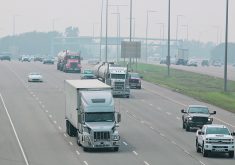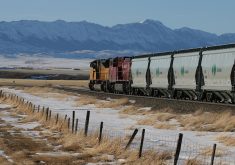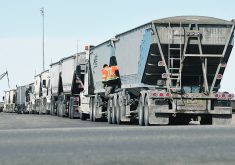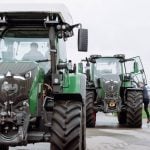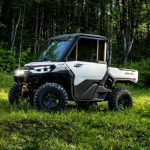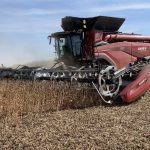Some Tier 4i DPF truck owners want their entire emissions system removed at an independent shop. Others bring their trucks to an original equipment manufacturer dealer only for chip work.
Most major truck dealers in Winnipeg agreed that the latest aftermarket electronic control technology has evolved to the point that diesel particulate filter, Tier 4 Interim trucks can finally be turned into reliable machines.
Dealers contacted include Freightliner, International, Western Star, Peterbilt, Kenworth, Mack, Volvo and Caterpillar, formerly an engine supplier for highway tractors.
Although some OEM dealers had previously offered the complete strip and chip treatment, removal and modification, they have all removed this alternative from their menus.
Read Also

Manitoba extends Crown land rent freeze
Manitoba government links the continued rental rate freeze on grazing and forage leases to economic and environmental challenges facing the industry
All eight dealers agreed that uncertainty over future legal issues with strip and chip engines was the main reason for halting the practice.
“I think potential buyers can drop their fear of the ’08, ’09 and ’10 trucks with domestic engines,” said Dean Willerton, used truck manager at Kenworth in Winnipeg.
“The latest technology has pretty well solved the reliability problems owners had with that group of engines. And the cost of just replacing the chip is more reasonable than the full strip down treatment.”
One of the independent shops offering the chip-only alternative is Taber Diesel in Taber, Alta.
Company owner Cam Mandel said his shop will not remove OEM emission systems. It only installs aftermarket modules, or chips as they are more commonly known.
“We’re the biggest Bosch dealer in Canada and Bosch leans on their dealers to be green. So we make sure we stay within all the rules,” said Mandel.
“There are already a number of (American) states requiring the sniff test to get your truck plates, and it’s only a matter of time before that’s widespread. We don’t want to be part of that mess.”
He said the other consideration is that there’s less need today to strip an engine of the equipment required by the U.S. Environmental Protection Agency. The Austrian-built Steinbauer module that he has been installing for the past five years does a decent job of making DPF engines more reliable and efficient, he added.
Mandel doubts anybody can make Tier 4i engines perfect. He thinks there will always be reliability issues with that group, but upgrading to a high quality electronic control module (ECM) does help.
He said the Cat C15 engine that goes into Rosenbauer fire trucks is one good example. Fire trucks need to be powerful and reliable, but they still must meet emission standards.
Rosenbauer wasn’t happy with the standard C15, so its engineers worked with Steinbauer and Cat engineers to see if they could build a better ECM.
Without altering the engine, the C15 increased from 550 horsepower to 650 h.p. and had a cleaner exhaust once the new Steinbauer module was installed. Although this may be an extreme example, it demonstrates how much can be accomplished simply by tuning the electronics.
Taber Diesel also installs Steinbauer modules on new trucks. One of its customers is an independent owner/operator who has a contract hauling barley from Camrose to Didsbury, Alta., and saw 0.3 to 0.4 miles per gallon benefit along with additional power.
“But here’s the big thing,” Mandel said.
“He now makes the loaded trip to Didsbury 17 to 20 minutes quicker than before. Going up the hills, there’s no more shifting gears and lugging the motor. The module lets him keep the 110,000 pound rig running at 105 km/h on the uphill instead falling down to 80 km/h. The guys who really notice the difference with this module are the ones who work their truck hard: the Super B and cattle liner guys.”
The Steinbauer chipped older engines may make more power available to do the work, but the new way of doing business doesn’t appeal to drivers.
Mandel said that operators complain: “I traded in my 450 h.p. truck for a new 550 h.p. truck, but the new truck is slower.”
He said the extra 100 h.p. is actually there, but it’s not available until the truck is loaded and the power is needed.
“It’s called soft power or lazy power,” he said.
The ECM will not let the driver accelerate hard when the truck is light. Soft power saves fuel, lessens emissions and lets the truck live longer.
“The truck may seem slower because you expect to feel the extra power,” he said.
“An electronic accelerometer tells the ECM that the empty truck is not allowed to accelerate any faster than a fully loaded truck.”
Steinbauer is working with a fleet of 1,100 trucks in Texas to find other enhancements to highway tractor performance. With an annual diesel expenditure of $100 million, the company is open to suggestions.
The stop and go concept now showing up on some cars is one of the things being tried in Texas. The engine stops automatically when the driver stops the truck and starts automatically when the driver steps on the throttle. If adopted, stop and go would put an end to idling diesels.
Mandel said the module will cost $1,700 to $2,700, depending on the engine. Although the modules all look the same, the software inside is tailored for each family of engines.
“The big thing is the harness,” he said.
“That can cause a lot of grief with some aftermarket products. We don’t cut any wires or splice into anything. We install a new harness that’s specific to each engine.
“For instance, the Mercedes 900 and 4000 Detroit Diesel engines in Freightliners have a very complex harness. They have great big plugs that cost $500 each. And there are four of them, so that’s a more expensive kit.
“Volvo engines continue to be a problem. Their total numbers on the North American continent are so much lower than Cat or Cummins. The aftermarket just hasn’t bothered to build a plug in solution for Volvo.”
For more information, contact Cam Mandel at 403-223-9636.






